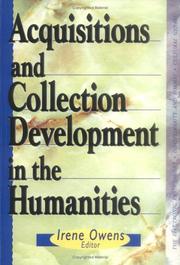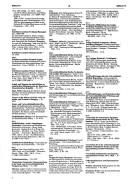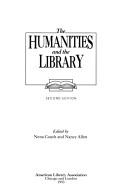| Listing 1 - 10 of 28 | << page >> |
Sort by
|
Book
ISBN: 9780838948231 Year: 2021 Publisher: Chicago (Ill.) : ALA editions,
Abstract | Keywords | Export | Availability | Bookmark
 Loading...
Loading...Choose an application
- Reference Manager
- EndNote
- RefWorks (Direct export to RefWorks)

ISBN: 0789003686 Year: 1997 Publisher: New York London Haworth Press
Abstract | Keywords | Export | Availability | Bookmark
 Loading...
Loading...Choose an application
- Reference Manager
- EndNote
- RefWorks (Direct export to RefWorks)
Book
Year: 1973 Publisher: Bucureşti : Minerva,
Abstract | Keywords | Export | Availability | Bookmark
 Loading...
Loading...Choose an application
- Reference Manager
- EndNote
- RefWorks (Direct export to RefWorks)
Bibliothekskatalog. --- Humanities libraries --- Library resources --- History --- Cantacuzino, Constantin, --- Libraries.
Book
Year: 1954 Publisher: Bukavu, Congo Belge : CCTA,
Abstract | Keywords | Export | Availability | Bookmark
 Loading...
Loading...Choose an application
- Reference Manager
- EndNote
- RefWorks (Direct export to RefWorks)

ISBN: 3744301036 Year: 1991 Publisher: Weimar Klassikerstätten zu Weimar
Abstract | Keywords | Export | Availability | Bookmark
 Loading...
Loading...Choose an application
- Reference Manager
- EndNote
- RefWorks (Direct export to RefWorks)
German literature --- Humanities libraries --- Library resources --- Bibliography --- Zentralbibliothek der Deutschen Klassik --- Bibliography.

ISBN: 0838906087 Year: 1993 Publisher: Chicago American Library Association
Abstract | Keywords | Export | Availability | Bookmark
 Loading...
Loading...Choose an application
- Reference Manager
- EndNote
- RefWorks (Direct export to RefWorks)
Human sciences (algemeen) --- Documentation and information --- 009 <01> --- Humanities libraries --- -Special libraries --- Humaniora. Geesteswetenschappen--Bibliografieën. Catalogi --- -Humaniora. Geesteswetenschappen--Bibliografieën. Catalogi --- 009 <01> Humaniora. Geesteswetenschappen--Bibliografieën. Catalogi --- -009 <01> Humaniora. Geesteswetenschappen--Bibliografieën. Catalogi --- Special libraries --- United States --- Humanities libraries - United States.
Book
Year: 1960 Publisher: Nancy : École nationale des eaux et fôrets,
Abstract | Keywords | Export | Availability | Bookmark
 Loading...
Loading...Choose an application
- Reference Manager
- EndNote
- RefWorks (Direct export to RefWorks)
Multi
ISBN: 9781783304974 9781783304981 9781783304998 9781783305216 1783305215 1783304995 1783304987 1783304979 Year: 2022 Publisher: London
Abstract | Keywords | Export | Availability | Bookmark
 Loading...
Loading...Choose an application
- Reference Manager
- EndNote
- RefWorks (Direct export to RefWorks)
Book
Year: 2016 Publisher: West Lafayette, Indiana : Purdue University Press,
Abstract | Keywords | Export | Availability | Bookmark
 Loading...
Loading...Choose an application
- Reference Manager
- EndNote
- RefWorks (Direct export to RefWorks)
Laying the Foundation: Digital Humanities in Academic Libraries examines the library’s role in the development, implementation, and instruction of successful digital humanities projects. It pays special attention to the critical role of librarians in building sustainable programs. It also examines how libraries can support the use of digital scholarship tools and techniques in undergraduate education. Academic libraries are nexuses of research and technology; as such, they provide fertile ground for cultivating and curating digital scholarship. However, adding digital humanities to library service models requires a clear understanding of the resources and skills required. Integrating digital scholarship into existing models calls for a reimagining of the roles of libraries and librarians. In many cases, these reimagined roles call for expanded responsibilities, often in the areas of collaborative instruction and digital asset management, and in turn these expanded responsibilities can strain already stretched resources. Laying the Foundation provides practical solutions to the challenges of successfully incorporating digital humanities programs into existing library services. Collectively, its authors argue that librarians are critical resources for teaching digital humanities to undergraduate students and that libraries are essential for publishing, preserving, and making accessible digital scholarship.
Academic libraries --- Humanities libraries --- Humanities --- Humanities --- Humanities --- Humanities --- Digital libraries. --- Research --- Data processing. --- Electronic information resources. --- Study and teaching (Higher)
Book
ISBN: 9781783304974 9781783304981 9781783304998 9781783305216 Year: 2022 Publisher: London Facet Publishing
Abstract | Keywords | Export | Availability | Bookmark
 Loading...
Loading...Choose an application
- Reference Manager
- EndNote
- RefWorks (Direct export to RefWorks)
The demand to decolonise the curriculum has moved from a protest movement at the margins to the centre of many institutions, as reflected by its inclusion in policies and strategies, and numerous initiatives in libraries and archives that have responded to the call, and are critically examining their own historic legacies and practices to support institutional and societal change.Narrative Expansions: Interpreting Decolonisation in Academic Libraries explores the ways in which academic libraries are working to address the historic legacies of colonialism, in the context of decolonising the curriculum and the university. It acknowledges and explores the tensions and complexities around the use of the term decolonisation, how it relates to other social justice aims and approaches, including critical librarianship, and what makes this work specific to decolonisation. The book is international in scope, and considers the contextual nature of decolonisation, with discussion of the impacts of settler colonialism, and post-colonial contexts with authors from Canada, the United States and Kenya, as well as universities in the UK.Split into two sections, the book first addresses experiential contexts, discussing the environment in which the academic library is enmeshed: legacy knowledge systems, the neo-liberal university, the pervasive Whiteness of the higher education sector, the global publishing industry - how these structures are constitutive of coloniality and how they can be challenged. It then brings together theory and practice featuring case studies interpreting what it means to 'decolonise' in information literacy, collection management, inclusive spaces, LIS education, research methods and knowledge production through the lens of critical pedagogy, critical information literacy and Critical Race Theory (CRT). The book also addresses the impact and implications of the Whiteness of university library staffing. Bringing together the theory and practice of an area of critical concern to the academy, this book is an important reference for academic librarians, educators and researchers in LIS, education and sociology.
| Listing 1 - 10 of 28 | << page >> |
Sort by
|

 Search
Search Feedback
Feedback About UniCat
About UniCat  Help
Help News
News